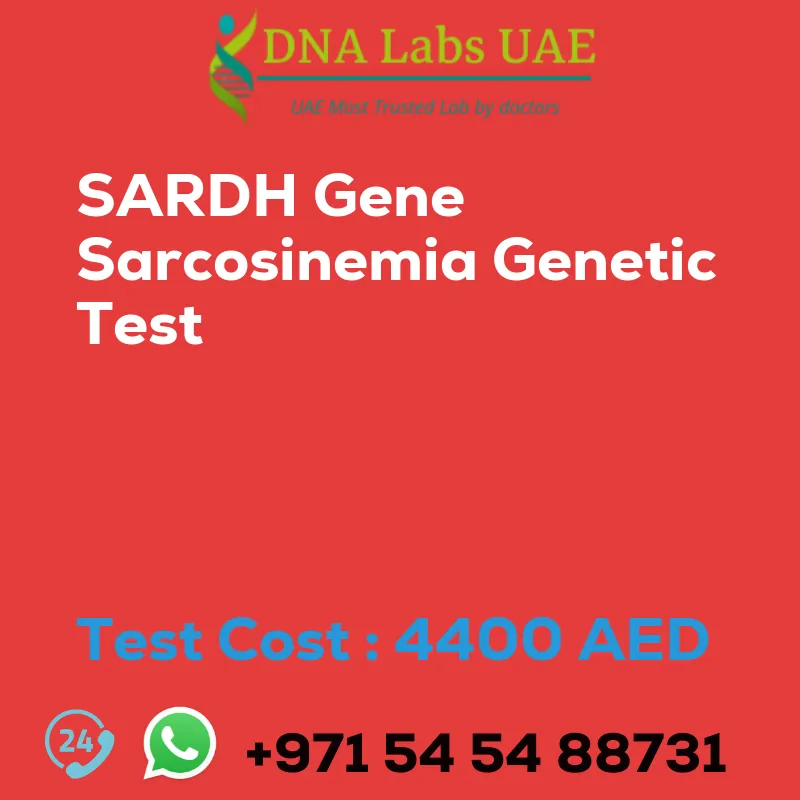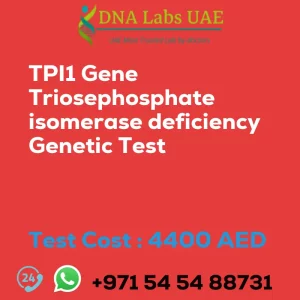SARDH Gene Sarcosinemia Genetic Test
Cost: 4400.0 AED
Test Details
The SARDH gene is associated with the condition called sarcosinemia. Sarcosinemia is a rare inherited metabolic disorder characterized by elevated levels of sarcosine in the blood and urine. It is caused by mutations in the SARDH gene, which provides instructions for producing an enzyme called sarcosine dehydrogenase.
Sarcosinemia can lead to symptoms such as developmental delay, intellectual disability, and speech abnormalities. However, some individuals with sarcosinemia may not show any symptoms at all.
NGS (Next-Generation Sequencing) genetic testing is a type of genetic testing that allows for the analysis of multiple genes simultaneously. In the context of sarcosinemia, NGS genetic testing can be used to identify mutations in the SARDH gene that are responsible for the condition. This testing method provides a comprehensive analysis of the genetic code, allowing for a more accurate diagnosis of sarcosinemia.
NGS genetic testing for sarcosinemia can be performed using a blood or saliva sample. The sample is sent to a laboratory where the DNA is extracted and sequenced. The sequencing data is then analyzed to identify any mutations or variations in the SARDH gene.
Genetic testing can be helpful in confirming a diagnosis of sarcosinemia, especially in individuals with atypical symptoms or when there is a family history of the condition. It can also be used for carrier testing in individuals who have a family history of sarcosinemia but do not show any symptoms themselves.
It is important to note that genetic testing for sarcosinemia should be done under the guidance of a healthcare professional or a genetic counselor who can provide appropriate counseling and interpretation of the results.
Test Information
- Components: SARDH Gene Sarcosinemia Genetic Test
- Price: 4400.0 AED
- Sample Condition: Blood or Extracted DNA or One drop Blood on FTA Card
- Report Delivery: 3 to 4 Weeks
- Method: NGS Technology
- Test Type: Metabolic Disorders
- Doctor: General Physician
- Test Department: Genetics
- Pre Test Information: Clinical History of Patient who is going for SARDH Gene Sarcosinemia NGS Genetic DNA Test, A Genetic Counselling session to draw a pedigree chart of family members affected with Sarcosinemia
| Test Name | SARDH Gene Sarcosinemia Genetic Test |
|---|---|
| Components | |
| Price | 4400.0 AED |
| Sample Condition | Blood or Extracted DNA or One drop Blood on FTA Card |
| Report Delivery | 3 to 4 Weeks |
| Method | NGS Technology |
| Test type | Metabolic Disorders |
| Doctor | General Physician |
| Test Department: | Genetics |
| Pre Test Information | Clinical History of Patient who is going for SARDH Gene Sarcosinemia NGS Genetic DNA Test A Genetic Counselling session to draw a pedigree chart of family members affected with Sarcosinemia |
| Test Details |
The SARDH gene is associated with the condition called sarcosinemia. Sarcosinemia is a rare inherited metabolic disorder characterized by elevated levels of sarcosine in the blood and urine. It is caused by mutations in the SARDH gene, which provides instructions for producing an enzyme called sarcosine dehydrogenase. Sarcosinemia can lead to symptoms such as developmental delay, intellectual disability, and speech abnormalities. However, some individuals with sarcosinemia may not show any symptoms at all. NGS (Next-Generation Sequencing) genetic testing is a type of genetic testing that allows for the analysis of multiple genes simultaneously. In the context of sarcosinemia, NGS genetic testing can be used to identify mutations in the SARDH gene that are responsible for the condition. This testing method provides a comprehensive analysis of the genetic code, allowing for a more accurate diagnosis of sarcosinemia. NGS genetic testing for sarcosinemia can be performed using a blood or saliva sample. The sample is sent to a laboratory where the DNA is extracted and sequenced. The sequencing data is then analyzed to identify any mutations or variations in the SARDH gene. Genetic testing can be helpful in confirming a diagnosis of sarcosinemia, especially in individuals with atypical symptoms or when there is a family history of the condition. It can also be used for carrier testing in individuals who have a family history of sarcosinemia but do not show any symptoms themselves. It is important to note that genetic testing for sarcosinemia should be done under the guidance of a healthcare professional or a genetic counselor who can provide appropriate counseling and interpretation of the results. |








